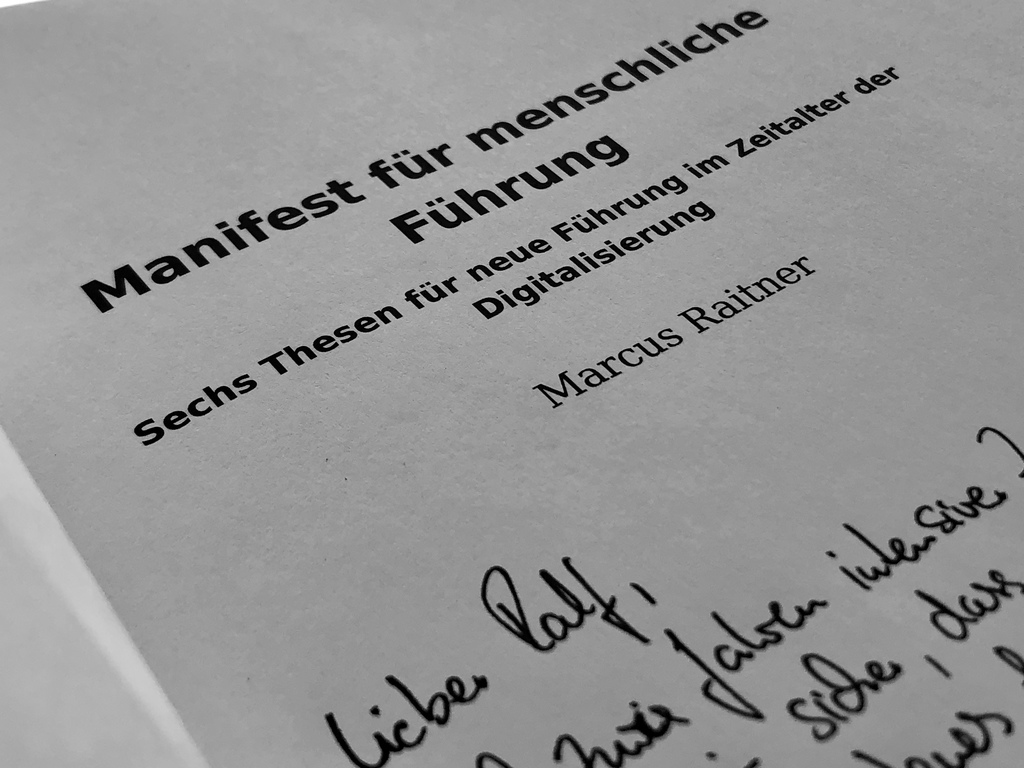Only those who can lead themselves can lead others. This is how Father Anselm Grün sums up the essential challenge of self-leadership. Those who want to serve life and unleash human potential as described in the Manifesto for Human(e) Leadership need first and foremost clarity about the nature of life and especially about their life. Only who has? And who takes the time today to think about the nature of life? A short excursion into Taoism exemplified by the evolution of the Manifesto for Human(e) Leadership.
Life is not a Journey
A good traveler has no fixed plans, and is not intent on arriving.
Laozi
Since school days, we rush from promotion to promotion (a strangely passive term and process in the context of leading your life) in the hope of making it and reaching a goal of some kind. Time- and self-management guides therefore also encourage us to write our own eulogy so that we can become aware of our life goals and work towards them.
Perhaps, however, life is not such a journey towards a destination at all, but the journey itself is the goal. For this reason, the popular English philosopher Alan Watts compares the nature of our lives to playing a piece of music or dancing:
We thought of life by analogy with a journey, with a pilgrimage, which had a serious purpose at that end, and the thing was to get to that thing at that end. Success, or whatever it is, or maybe heaven after you’re dead. But we missed the point the whole way along. It was a musical thing, and you were supposed to sing or to dance while the music was being played.
Alan Watts
Wu wei: Act without Forcing
Wu wei (無為) is the central concept of Taoism. It is first mentioned in the Tao Te Ching, which according to legend goes back to the sage Laozi (ca. 6th century BC). Literally translated “Wu” simply means “not”, thus being a negation, and “Wei” means doing, acting or effort. Literally translated Wu wei therefore means non-action. However, this does not mean inactivity or laziness, but rather the refusal to act against the nature of things. The translation that I like best is the one I heard from Alan Watts (see this video): act without forcing.
Act without doing;
Daodejing
work without effort.
Think of the small as large
and the few as many.
Confront the difficult
while it is still easy;
accomplish the great task
by a series of small acts.
Wu wei therefore means – completely in the spirit of agility – recognizing and using the possibilities available here and now, making small steps and then learning from these steps, which eventually leads to great accomplishments.
Wu Wei in Practice: The Evolution of the Manifesto for Human(e) Leadership
The idea for the Manifesto for Human(e) Leadership was born on January 29, 2018 following a workshop in the BMW Group IT as part of our agile transformation. In this workshop, four hierarchical levels from the employee to the vice president reflected on how leadership has to change through the agile transformation. At the core of the reflections and this workshop were the convictions that agility is essentially based on autonomy, self-organization and subsidiarity, that leadership must now be distributed among several roles and that it thus has to change.
Somehow, at the end of this workshop, the idea came up to summarize the findings of countless sticky notes from three hours of discussion in the style of the Manifesto for Agile Software Development. Several days later I started the first attempt with this first thesis on Twitter (and LinkedIn) – and this is how it all started:
Gradually, the remaining five theses of the manifesto developed within a few days, which I then finally published not even a week after this first tweet summarized here in the blog:
The manifesto triggered many internal and external discussions in which I had to become clearer about my interpretation of the theses. From these discussions and considerations an article on each thesis arose in the following month (#1, #2, #3, #4, #5, #6).
As the first anniversary of the Manifesto approached, I first thought about updating the Manifesto and adding, for example, “Asking questions more than giving answers”. But somehow I stumbled across Leanpub and decided I’d rather publish the Manifesto with the detailed articles and others that would go well with it as a brief e‑book, which I then did exactly one year after the Manifesto was released.

And after the e‑books (German and English) found several hundred readers, I had the idea that a printed book would also be very nice, not least because you can hand it to a manager as an expression of appreciation. So I took the dust off my LaTeX knowledge, which I had never used since my doctorate, and completely reworked the e‑book into a paperback, which is available since April 10, 2019 on Amazon (only in the German version … so far).
You can’t connect the dots looking forward; you can only connect them looking backwards. So you have to trust that the dots will somehow connect in your future. You have to trust in something — your gut, destiny, life, karma, whatever. This approach has never let me down, and it has made all the difference in my life.
Steve Jobs
In retrospect, this path of development sounds stringent and logical, but it was never planned. I never intended to publish a book on the Manifesto and I did not intend to become an author in the eulogy exercise. This path emerged from the opportunities that arose step by step. Very wu wei: acting in flow without forcing anything.



